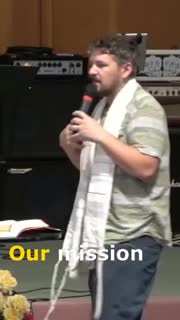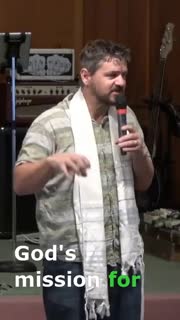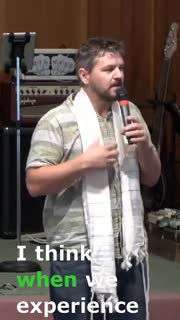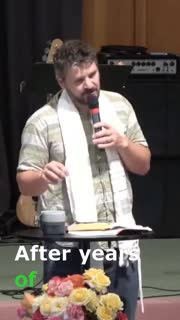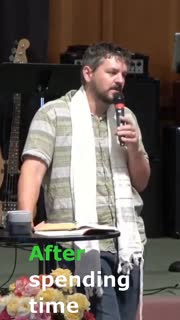Embracing Discontent: A Journey to Deeper Faith
Devotional
Sermon Summary
Bible Study Guide
Sermon Clips
### Quotes for Outreach
1. "Our mission at St. John's Church is to know God and or is to love God and love people, period. And that's really the mission, too, and the vision of the spiritual journey, this journey of transformation. The last two stops are an incredible love for God and incredible love for people. And so that's our target. That's where we're going." (23 seconds)
2. "God's heart from the beginning and continues to this day is to dwell with us, is to be with us. And as we peek over into stop nine, we'll talk about in two weeks, stop nine is that intense love of God. God loves us so much and he wants us to experience him and God wants to be with us." (22 seconds)
3. "There's something innate within us, as creatures, as humans, that we want to worship. We need, we want to find something. And what happens is Moses comes down the mountain in this next chapter. What does he find? After spending 40 days, he comes down and he looks at all the people. And people, already, they have cast aside God, and they've built for themselves a golden calf, and they're worshiping something else." (39 seconds)
4. "God's mission for the church is to make the world a better place. And the problem. The problem in any organization, in any institution, you have power and control. And when that power and control take over, yeah, it becomes problematic. And that is, I think, what's wrong with the world is that desire, that longing for power and control. And the church is susceptible to that. But the church isn't the problem. It's the people who have hijacked the church." (40 seconds)
5. "I think when we experience Jesus in a way like that, our instinct is to try to build a tabernacle, to establish routine, to establish some kind of worship. There's a deeper message there that Jesus is like, no, just, this isn't the end. That's not the point. Experience that, but don't stay there." (28 seconds)
### Quotes for Members
1. "Stop one is an ignorance of sin. An ignorance of the problem of evil. We talked about that two weeks ago and we talked about sin. And sin is a reality that is around us that we all live in. Stop two then is you become aware that there's a problem, but you're indifferent to it. You don't care too much about it. You begin to be aware of it, but that's where it ends. Stop three. Stop four is then you become concerned. You have a growing concern for this problem. And then stop four is confession and is repentance. It's when we come to faith in Jesus. We ask Jesus to forgive us." (52 seconds)
2. "After years of involvement in the Christian faith, most people slip into a spiritual coma. Their faith becomes a series of rituals, routines, recitations, rules, relationships, and responsibilities. Without noticing it, their spiritual goals also slip into a more relaxed state. So they're no longer stretching their faith muscles and pushing themselves to explore and master new. Rather than sustaining their passion for getting closer to God, they become comfortable with their spiritual experience." (66 seconds)
3. "After spending time in religious activity, after spending time in that stop, we find that our soul becomes discontent. We get caught up in the rituals and the practices. These are important, but there's still this hole inside of us. So this holy discontent is most likely instigated by God to jar them into re-evaluating what they want from Him and from life. It's a major decision point for the believers who get this far along the journey. And it's at this point in their pilgrimage that they must make some monumentous, glorious choices." (50 seconds)
4. "I think, stop five, religious activity and how we practice our faith. I think we need to caution ourself that if we stay in this stop for too long, our heart can get cold. But if we don't stay in it long enough, I think we lack a foundation. There's something that happens here. And I do think 10 years is a good mark. And there's Christian education that happens here. We learn about God." (47 seconds)
5. "I want to encourage us this morning to continue to ask these questions. And in this crisis, don't quickly gloss over it. But I think it's important for us to spend time in the tension. When people say the church is what's wrong with the world today. I love the church. And I strongly believe that the church is also what's right with the world today." (30 seconds)
Ask a question about this sermon
1. "Our mission at St. John's Church is to know God and or is to love God and love people, period. And that's really the mission, too, and the vision of the spiritual journey, this journey of transformation. The last two stops are an incredible love for God and incredible love for people. And so that's our target. That's where we're going." (23 seconds)
2. "God's heart from the beginning and continues to this day is to dwell with us, is to be with us. And as we peek over into stop nine, we'll talk about in two weeks, stop nine is that intense love of God. God loves us so much and he wants us to experience him and God wants to be with us." (22 seconds)
3. "There's something innate within us, as creatures, as humans, that we want to worship. We need, we want to find something. And what happens is Moses comes down the mountain in this next chapter. What does he find? After spending 40 days, he comes down and he looks at all the people. And people, already, they have cast aside God, and they've built for themselves a golden calf, and they're worshiping something else." (39 seconds)
4. "God's mission for the church is to make the world a better place. And the problem. The problem in any organization, in any institution, you have power and control. And when that power and control take over, yeah, it becomes problematic. And that is, I think, what's wrong with the world is that desire, that longing for power and control. And the church is susceptible to that. But the church isn't the problem. It's the people who have hijacked the church." (40 seconds)
5. "I think when we experience Jesus in a way like that, our instinct is to try to build a tabernacle, to establish routine, to establish some kind of worship. There's a deeper message there that Jesus is like, no, just, this isn't the end. That's not the point. Experience that, but don't stay there." (28 seconds)
### Quotes for Members
1. "Stop one is an ignorance of sin. An ignorance of the problem of evil. We talked about that two weeks ago and we talked about sin. And sin is a reality that is around us that we all live in. Stop two then is you become aware that there's a problem, but you're indifferent to it. You don't care too much about it. You begin to be aware of it, but that's where it ends. Stop three. Stop four is then you become concerned. You have a growing concern for this problem. And then stop four is confession and is repentance. It's when we come to faith in Jesus. We ask Jesus to forgive us." (52 seconds)
2. "After years of involvement in the Christian faith, most people slip into a spiritual coma. Their faith becomes a series of rituals, routines, recitations, rules, relationships, and responsibilities. Without noticing it, their spiritual goals also slip into a more relaxed state. So they're no longer stretching their faith muscles and pushing themselves to explore and master new. Rather than sustaining their passion for getting closer to God, they become comfortable with their spiritual experience." (66 seconds)
3. "After spending time in religious activity, after spending time in that stop, we find that our soul becomes discontent. We get caught up in the rituals and the practices. These are important, but there's still this hole inside of us. So this holy discontent is most likely instigated by God to jar them into re-evaluating what they want from Him and from life. It's a major decision point for the believers who get this far along the journey. And it's at this point in their pilgrimage that they must make some monumentous, glorious choices." (50 seconds)
4. "I think, stop five, religious activity and how we practice our faith. I think we need to caution ourself that if we stay in this stop for too long, our heart can get cold. But if we don't stay in it long enough, I think we lack a foundation. There's something that happens here. And I do think 10 years is a good mark. And there's Christian education that happens here. We learn about God." (47 seconds)
5. "I want to encourage us this morning to continue to ask these questions. And in this crisis, don't quickly gloss over it. But I think it's important for us to spend time in the tension. When people say the church is what's wrong with the world today. I love the church. And I strongly believe that the church is also what's right with the world today." (30 seconds)
